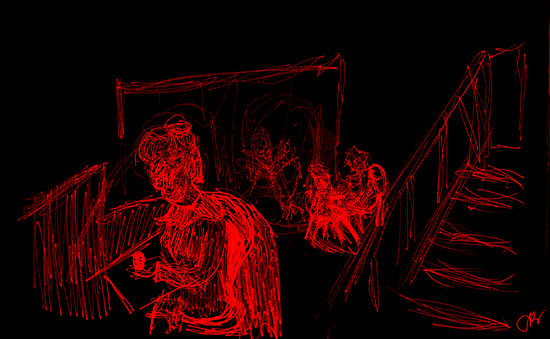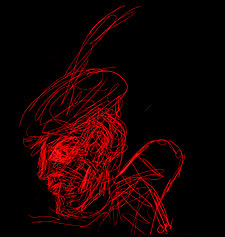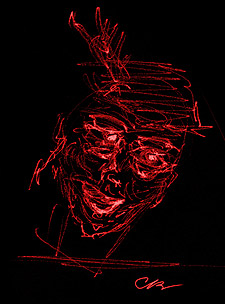
|
||
| Volume II, Issue I | Spring 2003 | |
| Spring 2003 Home Page |
| Culture, Politics & Technology |
| Fiction |
| Music |
| Poetry |
| Theater / Drama |
| About / Contact |
| Archive |
| Current Home Page |
Rosalina
Illustrated by Charlene Baldridge
"Who is she?"
"Who is who?"
Paul looked up from the register. Then realizing that Javier could only have meant the heavy-set woman who had just patted him on his shoulder on her way out, he set his pen down.
"Why do you ask?"
"I don't know. Something about her seems so ancient. It's funny that I should be saying this of a woman her age. What? She must be in her eighties. She has that air of mystery, the way women used to be or had the capacity to be. She is the very picture of the exacting ballet teacher in a Degas painting, the shadowy one in the background, the one the eyes are drawn to despite the beauty of the younger ballerina in the foreground."

"But she's not famous. Is she?" said Javier, incredulous.
"No," said Paul, suddenly irritated. Another one who would not understand. "Fame is not the most accurate measure of greatness."
He picked up his pen. "I have no time for this now, and don't you have an opera to review?"
But Javier couldn't get the soprano out of his head. He sensed a story in her. As it happened, she was at the opera house when he arrived, sitting just a row and two seats to the left down from him.
Earlier in the evening, at the Picador, he had sat at a table upstairs, right on the edge of the balcony. From there he had a bird's eye view of the front of the restaurant. It was a position that afforded him to observe people, in between parrying with his friends, unnoticed.
Javier had first spotted her going through a meal slowly at the corner table. A lone, elderly woman outfitted in black, nothing too unusual about that. But something about her drew his eye to her again and again.
And every time he did, he took mental notes of the details that made her look curiously anachronistic: fingers well appointed with Edwardian-style jewelry. Face, powdered pale with distinct marks of rouge on the cheekbones. Eyebrows, pencil-thin and dramatically arched, sitting atop a set of large eyes lined with kohl. Like a figure out of a Degas, only that she's in the café of a Renoir, he thought. This is what Greta Garbo might have looked like if she had, in her old age, grown fat. There was that same petulance, an aristocratic petulance. An island of her own. She did not look about. She showed little curiosity in the people around her. He saw her flick a few flecks of crumbs off the white tablecloth.
Now in the theater, he saw that her eyes were blue. She sat stiffly upright in her seat. She held up the program for a glance, put it down, and put it up again, as if impatient. When the lights came to for the intermission, he saw that her seat was empty. She did not return for the second act.
He returned to the Picador the next day. A Sunday, when it would be less busy, and when Paul, he figured, would be more willing to share a story or two. Not that Paul is a taciturn man, but he usually speaks just enough to charm his customers, which means that he knows more about his customers than they about him. He has never shared stories about his family or his background. The only thing anyone knows about him was that he was born in New York, spent his formative years in Spain and Mexico, and reserves his greatest passion for bullfighting.
 It was late afternoon. Paul was at the bar alone. Javier walked up to him. "Mind if I join you?"
Paul motioned for him to pull a stool.
It was late afternoon. Paul was at the bar alone. Javier walked up to him. "Mind if I join you?"
Paul motioned for him to pull a stool.
"What's her name?"
"Why are you so interested in her?"
"Look, there's something about her. Then, you said she was the greatest soprano of the 20th century. I'm a music critic and I don't know anything about her. Sounds like there is a story to this."
"Her name is Rosalina. Rosalina Blix," Paul began.
"And it is true that she was the greatest. Those who have the good fortune to have heard her ..." Here he paused. "There were few of them, and that's a long time ago, but those who heard her knew she had the gift. Her singing was like vocal gymnastics. All those leaps and turns, but always, there is control. I don't know many who can do Puccini without shrieking. That's admitted to these days; I've heard a number who complained that Puccini ruins the voice."
"What was her voice like?"
"Big, but never vulgar. Rich. Golden. Substantial, like a good Scotch. Oh, God gave her an intoxicating voice. She would be champagne one day, all bubbly; she would be the densest, smokiest red the next. But as you know, it is not just about voice, though that is necessary. At the end of the day, it is the heart that makes all the difference. That is the difference between good, great and the exceptional."
"But when was the last time she sang?" asked Javier. "You've heard her sing. Where?"
"A long time ago. 1954. At the Filarmonico in Verona. Like Callas, Rosalina gave her final performance as Tosca. 'Vissi d'arte – I've devoted my life to music and piety, why does God repay me with misery?'"
"How did she compare to Callas?"
"What Callas had to work hard to attain, she was blessed with at birth. Ah, they were divas all. But Callas, she was made of sterner stuff. And perhaps because she was less gifted, had to work harder, she had more humility."
"Wait, she stopped in the mid-'50s? If she is in her eighties now, am I right? Eighties?" asked Javier.
Paul nodded, "Yes, eighty-four, to be exact."
"That means," continued Javier, "she had a very short career."
"You are right," said Paul. "between her first performance at 20 and her last, there were only 15 years."
"So what happened?"
"You know that story about Callas, the one where she was performing Medea to a hissing audience? Callas ignored it until she reached the point in the text where she denounces Jason with 'Crudel! – Cruel man.' She took a long pause, looked directly at the audience, and sang the second Crudel with vehemence. She stopped again, and with her fist at the gallery, sang 'Ho dato tutto a te – I gave everything to you.'
"Rosalina was never hissed at. No. She was much too good. That was the problem. She gave everything, and she demanded everything back. Of course, the audience disappointed her. They wept, they awarded thunderous applause, they stood to ovation. But that was not good enough for her. Truth is, she demanded complete submission to the art she saw herself as a vassal of. She served god, and not the people. She didn't see herself as simply giving her audience a great time, an outing, a diversion for the night. But as it was, that was all the audience was capable of, rightly or wrongly. So whereas Callas did not see herself above her audience, she was their slave, and so was able to continue even after that performance, Rosalina was continuously frustrated. She started out thinking she had not tried hard enough, and so tried harder and harder. But she never felt she delivered. She served art, or god, whichever way you see it.
 That last performance, she finally despaired of the audience. She left the stage disgusted. A fellow actor heard her mumble angrily, 'Barbarians.' She did not come out for the applause."
That last performance, she finally despaired of the audience. She left the stage disgusted. A fellow actor heard her mumble angrily, 'Barbarians.' She did not come out for the applause."
"It sounds all very crazy to me," said Javier, at a loss for words.
"Indeed," replied Paul. They both looked away, as if contemplating.
"How do you know so much? You must have been a child then."
"My father's best friend married Rosalina's sister, Elle. And he was her manager."
"So she never sang again?"
"Never, not even in private, not even when her dearest friends entreated her to."
"And she's not American, is she?"
"Rosalina was born in Argentina. Her mother was Spanish, and her father a Swede. They had met in Argentina. She was visiting her relatives who had moved to Argentine to further their fortunes. And he had just established himself a ranch there. A young, determined man. They met, he fell in love, he proposed, she accepted, they married and had children. Rosalina, Elle and Hans. They moved to Mexico in the '30s, after her father, Leonard's, business failed. They would have gone to Sweden, but her father had fallen in love with bulls and bullfighting."
"Who did she study with?"
"Cecilia Westenholz. Nobody you would know of. She taught at a small academy in Buenos Aires. She wasn't famous, but she was a first-class teacher. She was exacting and she believed. It was she who recommended Rosalina to go to Italy. But that's not important, or no longer important. Rosalina, or Rosa, as her close friends called her, made her entrance in Verona and departed in Verona."
"That's it? That's her story?"
"No, that is not it. There is a slight twist."
Paul paused. The afternoon had slipped away. He looked out through the floor to ceiling glass windows, and saw the sky aflame in a brilliant red. "It never ceases to amaze me how even at the last moments of the day, even as day passes into night, there can be such beauty. Synonymous to our Rosalina." Here he sighed.
"Anyway, she disappeared for a while after the performance. She would not sing and would not allow any music played in the house. She became so depressed her family checked her into an asylum somewhere in Spain, probably around Seville, where her mother was from. When she got better, she went to live with her sister at her ranch in Mexico.
"Even then, she didn't talk much. She was kind to the children. I was already a young man then. Full of life, I guess, as all young men of those days are. We were always outdoors. None of that silly effete computer gadgets that kids occupy themselves with these days. I was very strong and I liked to work with the bulls when we went to visit the ranch. And she would come out to watch us work with the bulls. She would stand there and watch us for hours. I thought she marveled our vivacity. One time, and I remember this very clearly, she walked into the pen. She looked at me, and said, 'You love the bulls?' I said, 'Yes.' She asked, 'Then how can you bear to gore it? Why do you fight it?' I wish I were more eloquent then, or at least have thought about it more, for all I said was something stupid like, 'I love it, I love the bulls, but there's no meaning more to it.' She kept very quiet and walked away.
"A couple of days later, we went out for a day's outing to the mountains. We were out and I remember a full picnic basket. We weren't going to come back till late, but returned early for some reason. As we drove up the driveway, we heard this angelic voice coming out of the house. All the adults recognized it as Rosalina's. The new maid had found the records Elle had kept and had put one on. She was a live-in and had her child with her. When we walked in, we saw her holding her little one, rapt with tears in her eyes."
"Like Madonna and child," said Javier.
"Exactly."
"And?"
"You know, music had not been heard in that house for years. Rosalina banned it. But that day, she signaled that the maid was not to be disturbed and she went into her room. After that, music was allowed into their lives again. Rosalina tried to sing again, but she had lost the voice."
"Naked I came from my mother's womb, and naked shall I return; the Lord gave, and the Lord has taken away; blessed be the name of the Lord," came a voice behind them. Javier and Paul both turned around.
She stood there like an apparition. Smiling, she continued, "Behold I am of small account; what shall I answer thee? I lay my hand on my mouth ... I know that thou canst do all things, and that no purpose of thine can be thwarted… Therefore I have uttered what I did not understand, things too wonderful for me, which I did not know ... I had heard of thee by the hearing of the ear, but now my eye sees thee; therefore I despise myself, and repent in dust and ashes."
![]()
Spring 2003 Fiction Section | Spring 2003 Main Page
Current Fiction Section | Current Home Page
Copyright ©
Reprinted by permission of author, who retains all copyright and control.